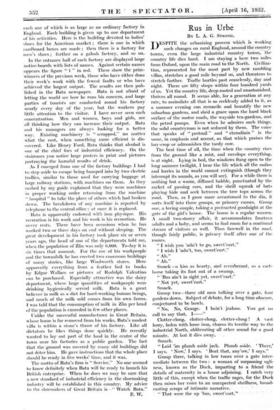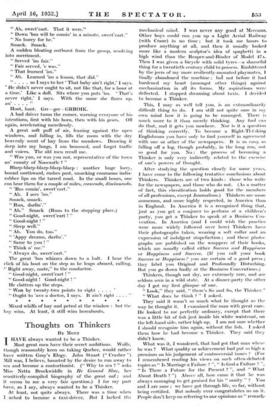Rus in thbe .
BY L. A. G. STRONG.
JJESPITE the urbanizing process which is working such changes on rural England, around the country towns, even the large industrial country towns, the country life dies hard. I am staying' a bare two miles from Oxford, upon the main road to the North. Civiliza- tion, represented for the most part by new rambling villas, stretches a good mile beyond us, and threatens to stretch further. Traffic hurtles past ceaselessly, day and night. There are fifty shops within four hundred yards of us. Yet the country life, deep-rooted and unastonished, thrives all round. It seems 'able, for a generation at any rate, to assimilate all that is so recklessly added to it, as a summer evening can reconcile and beautify the new suburban gardens, and shed a grace upon the hard black surface of the motor roads, the wayside tea-gardens, and the petrol pumps. Even when he admires such things, the solid countryman is not seduced by them. The voice that speaks of " peetroil " and " eterodinin " is the same, in emphasis and accent, as that which praises the hay-crop or admonishes the tardy cow.
The best time of all, the time when the country rises from the ground like a mist, and envelops everything, is at night. Lying in bed, the windows' flung open to the long summer twilight, I hear the life which all the radios and lorries in the world cannot extinguish (though they interrupt its sounds, as you will see). For a while there is nothing but a warm, diffused babble, punctuated by the racket of passing cars, and the shrill squeak of bats playing hide and seek between the tree tops across the road. Then, as I grow more accustomed to the din, it sorts itself into three groups, or primary causes. Group one, a loving couple, taking a protracted goodnight at the gate of the girl's house. The house is a regular warren. A small two-storey affair, it accommodates 'fourteen adults and a baby, and seems to find room for a continual stream of visitors as well. Thus farewell in the road, though fairly public, is privacy itself after one of the rooms.
"I wish you 'adn't to go, sweet'eart."
"I wish I 'adn't, too, sweet'eart."
Smack—a kiss as hearty, and reverberant, as a cart- horse taking its foot out of a swamp.
"'Bus ain't in sight yet, sweet'eart."
"Not yet, sweet'eart."
Smack.
Group two—three old men talking over a gate, four gardens down. Subject of debate, for a long time obscure, conjectured to be bowls.
"No, No, Gearge. I bain't jealous. You got 110 call to say that. I—" Clotter-clong, dotter-elong, clotter-clong ! A vast lorry, laden with loose iron, churns its terrific way to the industrial North, obliterating nil other sound for a good minute. At last it dies away. _
Smack.
"Laid 'im plumb aside jack. Plumb aside. Theer,' I says. 'Now,' I says. 'Beat that, any'ow,' I says."
Group three, talking in low tones over a gate inter- mediate between the two : a woman of surpassing ugli- ness, known as the Duck, imparting to a friend the details of maternity in a house adjoining. I catch very little of this, except when the traffic rages, for the Duck then raises her voice to an unexpected shrillness; broad- casting scraps of intimate narrative. '- "That were the op 'him, sweet'eart." •
• "AI, .sweet'eart. That it were."
"Down 'bus will be comin' in a minute, sweet'eart."
"No hurry for he."
Smack. Smack.
A sudden bleating outburst from the group, resolving into merriment.
"Served 'inn fair."
"Fair served, 'e was."
"That learned Ito."
"Ali. Learned 'im a lesson, that did."
" . . . . so I says to her That baby ain't right,' I says.
He didn't never ought to sit, not like that, for a hour at a time.' Like a doll. Sits where you puts 'im. 'That's never right,' I says. With the same she flares up, an' . . "
Hoot, hoot. Grr—grr—GRROIK.
A bad driver turns the corner, warning everyone of his intentions, first with his horn, then with his gears. Off again, accelerating mercilessly.
A great soft puff of air, leaning against the open windows, and falling in, fills the room with the dry heavenly scent of hay from the meadows. Drawing it deep into my lungs, I am bemused, and forget traffic and voices. The old men recall me.
" Was you, or was you not, representative of the town an' county of Noocastle ? "
Blarp-blarp-blarp-blarp-blarp : another huge lorry, bound northward, rushes past, smacking enormous india- rubber lips on the tarred road. In the small hours, one can hear them for a couple of miles, crescendo, diminuendo.
"'Bus comin', sweet'eart."
"Au. I sees Ito."
Smack, smack.
"Run, darline."
" Ah." Smack (Runs to the stopping place.) "Good-night, sweet'eart !
" Good-night ! "
"Sleep well."
"Ab. You do, too."
" 'Appy dreams, darlin'."
"Same to you!"
" Think o' me."
"Always do, sweet'eart."
The great 'bus whizzes down to a halt. I hear the click of his boot on the step as he leaps aboard, calling, ." Right away, mate," to the conductor.
"Good-night, sweet'eart ! "
" Good-night ! Good-night ! "
He clatters up the steps.
"Won by twenty-two points to eight . . .
"Ought to 'ave a doctor, I says. It ain't right . . . .
* * * * * * * * * Mixed whiffs of hay and petrol at the window ; but the hay wins. At least, it still wins hereabouts.









































 Previous page
Previous page